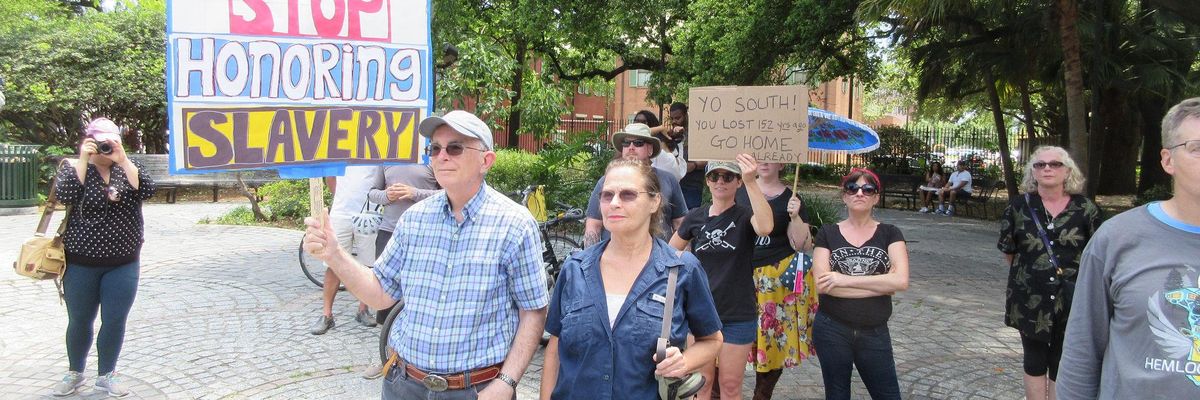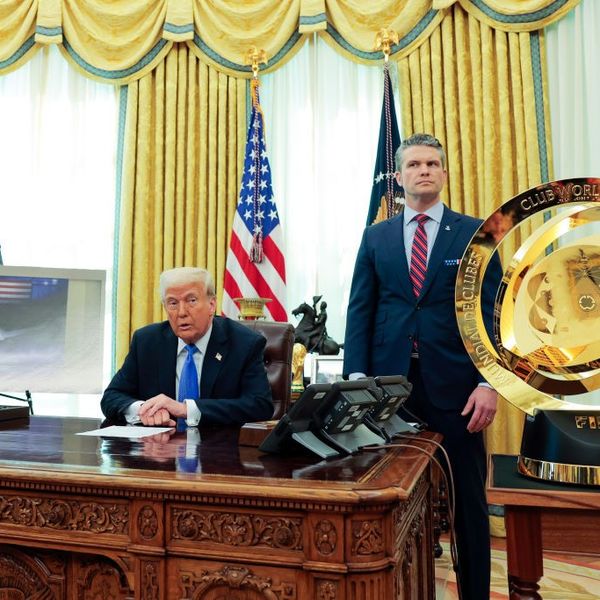
Citizens of southern cities including New Orleans have fought in recent months to have Confederate statues removed. (Photo: Infrogmation of New Orleans/Flickr/cc)
As Removal Movement Grows, Trump Sides With White Supremacists on Confederate Monuments
"The argument that the Confederate flag and other displays represent 'heritage, not hate' ignores the near-universal heritage of African Americans whose ancestors were enslaved by the millions."
Critics were quick to point out that President Donald Trump has once again put himself on the wrong side of efforts to combat racism and address white supremacy when he defended "beautiful" Confederate monuments in a Thursday morning tweet.
Trump tripled down on his failure to condemn last weekend's white supremacist rally in Charlottesville, Virginia on Thursday, tweeting in support of the protesters' stated cause: to preserve a monument to Confederate General Robert E. Lee. The president argued that the ongoing efforts of states and cities to take down statues of Confederate figures is "foolish" and that the monuments are an irreplaceable reminder of U.S. history.
\u201cSad to see the history and culture of our great country being ripped apart with the removal of our beautiful statues and monuments. You.....\u201d— Donald J. Trump (@Donald J. Trump) 1502975248
\u201c...can't change history, but you can learn from it. Robert E Lee, Stonewall Jackson - who's next, Washington, Jefferson? So foolish! Also...\u201d— Donald J. Trump (@Donald J. Trump) 1502975758
\u201c...the beauty that is being taken out of our cities, towns and parks will be greatly missed and never able to be comparably replaced!\u201d— Donald J. Trump (@Donald J. Trump) 1502976105
Since the violent rally in Charlottesville, some cities have begun expediting their efforts to remove statues memorializing Lee, Stonewall Jackson, and other leaders of the Confederacy. Baltimore officials swiftly took down two statues late Tuesday night, while civil rights groups and citizens of Gainesville, Florida and Lexington, Kentucky called for the removal of other Confederate monuments without the delays that have been involved in such decisions in New Orleans, Charlottesville, and other cities.
\u201cWe know that the "culture" of Confederacy Trump praises is white supremacy. Join @raypay_ call to #TakeThemDown https://t.co/NDcCClbqdL\u201d— ColorOfChange (@ColorOfChange) 1502986837
\u201cNo @realDonaldTrump, we MUST remove statues around the country celebrating white supremacy. https://t.co/S5xYrnVIyF w/ @ColorofChange\u201d— MoveOn (@MoveOn) 1502977500
Proponents of removing the monuments argue that they serve as painful reminders of slavery. As Tyler Zimmer pointed out this week in the socialist magazine Jacobin, Confederate symbols also recall the efforts of wealthy slave owners to recruit southerners into a worldview and a resulting bloody conflict built on the idea that poor white farmers had more in common with rich white landowners than they did with black slaves who had no economic power--a worldview of white supremacy:
In [fighting for the right to own slaves]...these men also betrayed their own class and themselves--all for the sake of protecting the wealth and power of a tiny ruling class who looked upon them with scorn. From the beginning of the Confederacy, the Southern ruling classes fretted over whether they could win over masses of poor, non-slaveowning whites to their cause. This, of course, is the problem every minority ruling class in history has had to face--the problem of how to make the sectional, particular interests of the ruling elite appear to be the universal interests of all.
Those who want the monuments taken down point out the significance of how many were erected decades after the Civil War, calling into question the notion that their sole purpose was to commemorate the lives lost. In a study in 2016, the Southern Poverty Law Center detailed how the vast majority of Confederate monuments were built between 1890 and 1920, around the time that Jim Crow laws came to prominence.
"The argument that the Confederate flag and other displays represent 'heritage, not hate' ignores the near-universal heritage of African Americans whose ancestors were enslaved by the millions in the South," said the report. "It trivializes their pain, their history and their concerns about racism--whether it's the racism of the past or that of today."
On Twitter, many took issue with Trump's statement that the monuments will be "never able to be comparably replaced!"--noting that many Americans have made more positive contributions to the country and the South than Robert E. Lee and other Confederate generals.
\u201c@DaCrunch @blogdiva Replace all the Confederate monuments and statues with abolitionists.\u201d— Liza Sabater \ud83c\uddf5\ud83c\uddf7\ud83d\udc78\ud83c\udffe\ud83c\udf39 (@Liza Sabater \ud83c\uddf5\ud83c\uddf7\ud83d\udc78\ud83c\udffe\ud83c\udf39) 1502980511
\u201cIf your concern is history will be forgotten, don't just tear down Confederate monuments, replace them: Tubman, Douglass, Truth, Washington\u201d— Joshua Janecek (@Joshua Janecek) 1502675392
An Urgent Message From Our Co-Founder
Dear Common Dreams reader, The U.S. is on a fast track to authoritarianism like nothing I've ever seen. Meanwhile, corporate news outlets are utterly capitulating to Trump, twisting their coverage to avoid drawing his ire while lining up to stuff cash in his pockets. That's why I believe that Common Dreams is doing the best and most consequential reporting that we've ever done. Our small but mighty team is a progressive reporting powerhouse, covering the news every day that the corporate media never will. Our mission has always been simple: To inform. To inspire. And to ignite change for the common good. Now here's the key piece that I want all our readers to understand: None of this would be possible without your financial support. That's not just some fundraising cliche. It's the absolute and literal truth. We don't accept corporate advertising and never will. We don't have a paywall because we don't think people should be blocked from critical news based on their ability to pay. Everything we do is funded by the donations of readers like you. Will you donate now to help power the nonprofit, independent reporting of Common Dreams? Thank you for being a vital member of our community. Together, we can keep independent journalism alive when it’s needed most. - Craig Brown, Co-founder |
Critics were quick to point out that President Donald Trump has once again put himself on the wrong side of efforts to combat racism and address white supremacy when he defended "beautiful" Confederate monuments in a Thursday morning tweet.
Trump tripled down on his failure to condemn last weekend's white supremacist rally in Charlottesville, Virginia on Thursday, tweeting in support of the protesters' stated cause: to preserve a monument to Confederate General Robert E. Lee. The president argued that the ongoing efforts of states and cities to take down statues of Confederate figures is "foolish" and that the monuments are an irreplaceable reminder of U.S. history.
\u201cSad to see the history and culture of our great country being ripped apart with the removal of our beautiful statues and monuments. You.....\u201d— Donald J. Trump (@Donald J. Trump) 1502975248
\u201c...can't change history, but you can learn from it. Robert E Lee, Stonewall Jackson - who's next, Washington, Jefferson? So foolish! Also...\u201d— Donald J. Trump (@Donald J. Trump) 1502975758
\u201c...the beauty that is being taken out of our cities, towns and parks will be greatly missed and never able to be comparably replaced!\u201d— Donald J. Trump (@Donald J. Trump) 1502976105
Since the violent rally in Charlottesville, some cities have begun expediting their efforts to remove statues memorializing Lee, Stonewall Jackson, and other leaders of the Confederacy. Baltimore officials swiftly took down two statues late Tuesday night, while civil rights groups and citizens of Gainesville, Florida and Lexington, Kentucky called for the removal of other Confederate monuments without the delays that have been involved in such decisions in New Orleans, Charlottesville, and other cities.
\u201cWe know that the "culture" of Confederacy Trump praises is white supremacy. Join @raypay_ call to #TakeThemDown https://t.co/NDcCClbqdL\u201d— ColorOfChange (@ColorOfChange) 1502986837
\u201cNo @realDonaldTrump, we MUST remove statues around the country celebrating white supremacy. https://t.co/S5xYrnVIyF w/ @ColorofChange\u201d— MoveOn (@MoveOn) 1502977500
Proponents of removing the monuments argue that they serve as painful reminders of slavery. As Tyler Zimmer pointed out this week in the socialist magazine Jacobin, Confederate symbols also recall the efforts of wealthy slave owners to recruit southerners into a worldview and a resulting bloody conflict built on the idea that poor white farmers had more in common with rich white landowners than they did with black slaves who had no economic power--a worldview of white supremacy:
In [fighting for the right to own slaves]...these men also betrayed their own class and themselves--all for the sake of protecting the wealth and power of a tiny ruling class who looked upon them with scorn. From the beginning of the Confederacy, the Southern ruling classes fretted over whether they could win over masses of poor, non-slaveowning whites to their cause. This, of course, is the problem every minority ruling class in history has had to face--the problem of how to make the sectional, particular interests of the ruling elite appear to be the universal interests of all.
Those who want the monuments taken down point out the significance of how many were erected decades after the Civil War, calling into question the notion that their sole purpose was to commemorate the lives lost. In a study in 2016, the Southern Poverty Law Center detailed how the vast majority of Confederate monuments were built between 1890 and 1920, around the time that Jim Crow laws came to prominence.
"The argument that the Confederate flag and other displays represent 'heritage, not hate' ignores the near-universal heritage of African Americans whose ancestors were enslaved by the millions in the South," said the report. "It trivializes their pain, their history and their concerns about racism--whether it's the racism of the past or that of today."
On Twitter, many took issue with Trump's statement that the monuments will be "never able to be comparably replaced!"--noting that many Americans have made more positive contributions to the country and the South than Robert E. Lee and other Confederate generals.
\u201c@DaCrunch @blogdiva Replace all the Confederate monuments and statues with abolitionists.\u201d— Liza Sabater \ud83c\uddf5\ud83c\uddf7\ud83d\udc78\ud83c\udffe\ud83c\udf39 (@Liza Sabater \ud83c\uddf5\ud83c\uddf7\ud83d\udc78\ud83c\udffe\ud83c\udf39) 1502980511
\u201cIf your concern is history will be forgotten, don't just tear down Confederate monuments, replace them: Tubman, Douglass, Truth, Washington\u201d— Joshua Janecek (@Joshua Janecek) 1502675392
Critics were quick to point out that President Donald Trump has once again put himself on the wrong side of efforts to combat racism and address white supremacy when he defended "beautiful" Confederate monuments in a Thursday morning tweet.
Trump tripled down on his failure to condemn last weekend's white supremacist rally in Charlottesville, Virginia on Thursday, tweeting in support of the protesters' stated cause: to preserve a monument to Confederate General Robert E. Lee. The president argued that the ongoing efforts of states and cities to take down statues of Confederate figures is "foolish" and that the monuments are an irreplaceable reminder of U.S. history.
\u201cSad to see the history and culture of our great country being ripped apart with the removal of our beautiful statues and monuments. You.....\u201d— Donald J. Trump (@Donald J. Trump) 1502975248
\u201c...can't change history, but you can learn from it. Robert E Lee, Stonewall Jackson - who's next, Washington, Jefferson? So foolish! Also...\u201d— Donald J. Trump (@Donald J. Trump) 1502975758
\u201c...the beauty that is being taken out of our cities, towns and parks will be greatly missed and never able to be comparably replaced!\u201d— Donald J. Trump (@Donald J. Trump) 1502976105
Since the violent rally in Charlottesville, some cities have begun expediting their efforts to remove statues memorializing Lee, Stonewall Jackson, and other leaders of the Confederacy. Baltimore officials swiftly took down two statues late Tuesday night, while civil rights groups and citizens of Gainesville, Florida and Lexington, Kentucky called for the removal of other Confederate monuments without the delays that have been involved in such decisions in New Orleans, Charlottesville, and other cities.
\u201cWe know that the "culture" of Confederacy Trump praises is white supremacy. Join @raypay_ call to #TakeThemDown https://t.co/NDcCClbqdL\u201d— ColorOfChange (@ColorOfChange) 1502986837
\u201cNo @realDonaldTrump, we MUST remove statues around the country celebrating white supremacy. https://t.co/S5xYrnVIyF w/ @ColorofChange\u201d— MoveOn (@MoveOn) 1502977500
Proponents of removing the monuments argue that they serve as painful reminders of slavery. As Tyler Zimmer pointed out this week in the socialist magazine Jacobin, Confederate symbols also recall the efforts of wealthy slave owners to recruit southerners into a worldview and a resulting bloody conflict built on the idea that poor white farmers had more in common with rich white landowners than they did with black slaves who had no economic power--a worldview of white supremacy:
In [fighting for the right to own slaves]...these men also betrayed their own class and themselves--all for the sake of protecting the wealth and power of a tiny ruling class who looked upon them with scorn. From the beginning of the Confederacy, the Southern ruling classes fretted over whether they could win over masses of poor, non-slaveowning whites to their cause. This, of course, is the problem every minority ruling class in history has had to face--the problem of how to make the sectional, particular interests of the ruling elite appear to be the universal interests of all.
Those who want the monuments taken down point out the significance of how many were erected decades after the Civil War, calling into question the notion that their sole purpose was to commemorate the lives lost. In a study in 2016, the Southern Poverty Law Center detailed how the vast majority of Confederate monuments were built between 1890 and 1920, around the time that Jim Crow laws came to prominence.
"The argument that the Confederate flag and other displays represent 'heritage, not hate' ignores the near-universal heritage of African Americans whose ancestors were enslaved by the millions in the South," said the report. "It trivializes their pain, their history and their concerns about racism--whether it's the racism of the past or that of today."
On Twitter, many took issue with Trump's statement that the monuments will be "never able to be comparably replaced!"--noting that many Americans have made more positive contributions to the country and the South than Robert E. Lee and other Confederate generals.
\u201c@DaCrunch @blogdiva Replace all the Confederate monuments and statues with abolitionists.\u201d— Liza Sabater \ud83c\uddf5\ud83c\uddf7\ud83d\udc78\ud83c\udffe\ud83c\udf39 (@Liza Sabater \ud83c\uddf5\ud83c\uddf7\ud83d\udc78\ud83c\udffe\ud83c\udf39) 1502980511
\u201cIf your concern is history will be forgotten, don't just tear down Confederate monuments, replace them: Tubman, Douglass, Truth, Washington\u201d— Joshua Janecek (@Joshua Janecek) 1502675392

